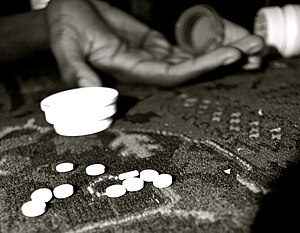
In New Jersey, you can now report drug overdoses without the fear of being arrested. (Photo credit: Wikipedia)
If you are the victim of a drug overdose or witnessed another person overdose on drugs in New Jersey, do not be afraid. Governor Chris Christie signed legislation shielding you from culpability when you call for medical help.
What is the Overdose Prevention Act?
On May 2, 2013, Governor Christie signed the Overdose Prevention Act (N.J.S.A. 2C:35-30). This new law allows individuals to report drug overdoses without the fear of being arrested. The New Jersey legislature and governor determined that the interest in incarcerating people for overdosing simply does not exceed the overwhelming public policy interest in caring for some of NJ’s most susceptible citizens (i.e. those addicted to illegal substances).
In many ways, the law changes the way the government looks at a person who overdoses on drugs. Instead of viewing him or her as a criminal, one who overdoses is viewed as a person who needs immediate medical attention.
What does all of this mean for you?
If you struggle with drug addiction or know a person going through it, you no longer have to feel like you cannot tell the authorities. Instead of trying to handle a near-death experience on your own, you can call 911, go to the hospital, and not have to worry about being thrown in jail for seeking medical help.
Who is Protected Under the Overdose Prevention Act (OPA)?
Aside from the person who actually overdoses and witnesses of the overdose, other people are shielded from culpability as well.
Under the OPA, health care professionals or pharmacists who—when acting in good faith—prescribe or dispense “opioid antidote” to a patient in an emergency situation will be shielded from criminal and civil liability. They are also immune from being arrested, charged, or prosecuted for criminal conduct arising out of their good faith medical decision.
However, any of the evidence that police officers or narcotic agents legally obtain, can be used against people who are not shielded under the law.
For example, imagine the following: John, George, and Pete are using drugs one night. Later that night, after Pete went home, John overdoses. George calls the authorities in order for John to receive proper medical attention. If police officers legally seized all of the drug paraphernalia, they could not use it to incriminate John or George.
After all, the Overdose Prevention Act shields John (because he is the one who overdosed) and George (because he witnessed the overdose and made the call). However, if the authorities could link the chain of evidence to Pete, they could arrest him for drug possession. Why? Pete left and never witnessed the overdose or made the 911 call.
Who Should You Contact?
If you or a loved one recently overdosed on drugs or was charged with drug possession in New Jersey, contact Rosenblum Law. Our team of experienced NJ criminal defense attorneys will defend your constitutional rights and do everything they can to get you the results you want. E-mail or call us today at 888-815-3649.

